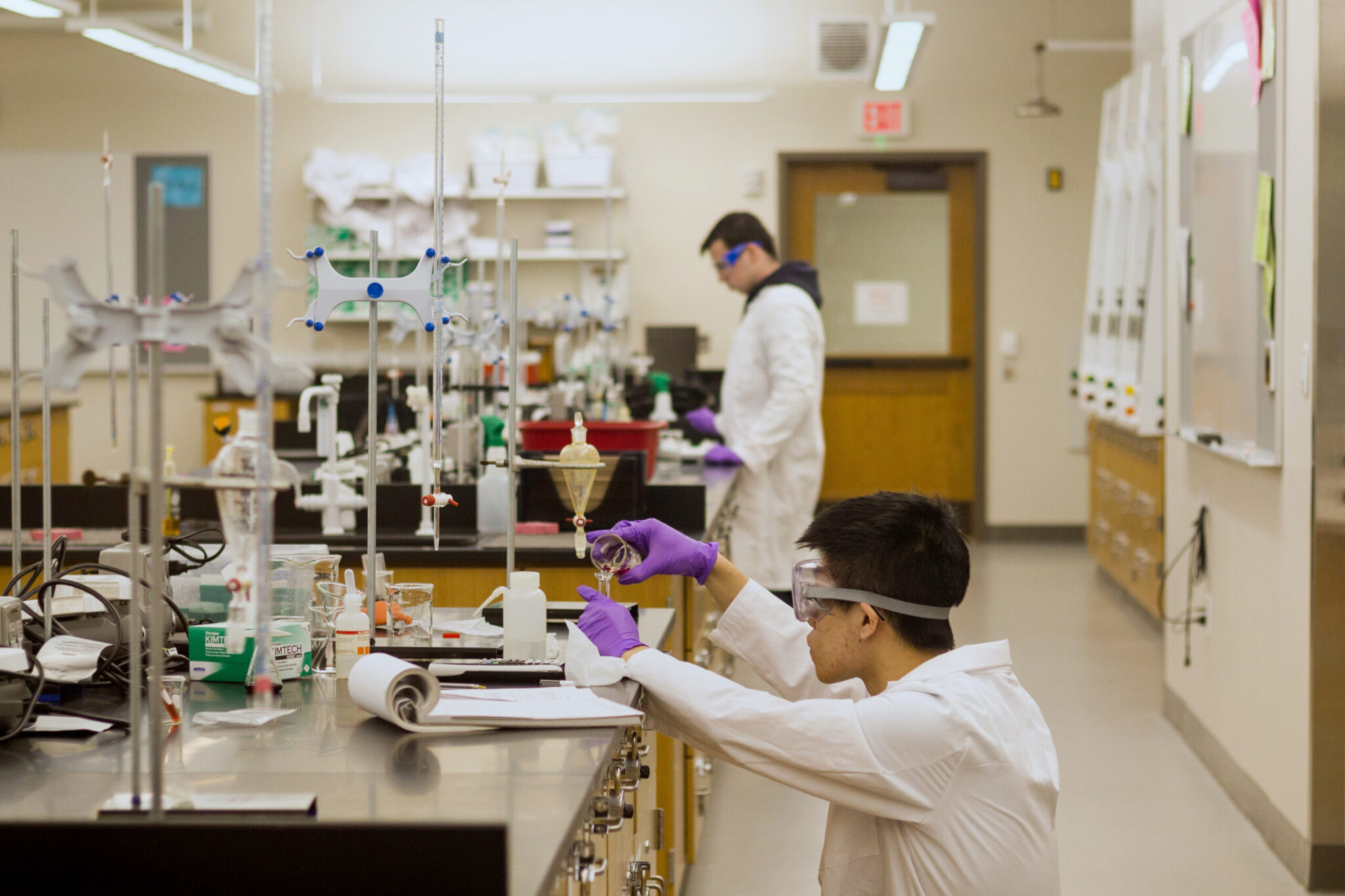Inside the Hahn Scholars program’s push to recruit top STEM students
The Hahn Scholarship supports a small cohort of Yale students with research funding.

Daniel Zhao, Senior Photographer
With a cohort of just 10 top students each year, Yale’s Hahn Scholars program is a little-known aspect of the University’s push to recruit high-achieving students in STEM.
The Hahn Scholars program, which is run by Associate Dean of STEM Education Sandy Chang ’88, supports students with strong science and engineering research backgrounds. The program offers a “tight-knit cohort” of students the opportunity to start conducting paid STEM research at the University in the spring of their first year, according to Chang. Additionally, Hahn scholars meet with each other and Chang monthly, and work with University faculty for career-building workshops.
Hahn Scholars also receive guaranteed funding — a stipend of $4,300 — for one summer of research. It is not possible to apply to the program, as Hahn Scholars are informed of their selection during the admissions process.
“I’ve greatly enjoyed my experience as a Hahn Scholar,” said Lila Schweinfurth ’25. “I’ve loved learning from and connecting with others in the community, and Dean Chang has been an invaluable resource. The experience has helped me to grow as a researcher.”
Building a community of scientists is an integral aspect of the initiative. As part of the scholarship, students are required to participate in social events and research presentations hosted by the Hahn program. These events are intended to foster interactions between Hahn Scholars, Yale faculty mentors and others involved in research at Yale.
Chang said that when he became dean of STEM in 2017, the University already had programs committed to increasing diversity in STEM. Specifically, the Science, Technology and Research Scholars program offers advising, research funding, laboratory experience and other forms of mentorship to first-generation and low-income students and underrepresented minorities — such as women and gender minorities as well as students of color.
However, Chang explained that the University needed a program to increase the number of top STEM students choosing to matriculate to Yale, aligning with the University’s larger priorities of honing its STEM offerings. The University at the time was offering a weekend of recruitment events specifically geared to STEM admits — the Yale Engineering and Science Weekend — but Chang wanted to expand this effort.
“We were losing top STEM students to MIT, Harvard and Stanford even though these students were exposed to YES-W,” Chang wrote in an email to the News. “I knew something more was needed.”
The Hahn program was endowed by and named for Scott Sang-Won Hahn ’94 in 2018. The first class of ten Hahn Scholars arrived in 2019.
For the last two years, five of the 10 selected Hahn Scholars — in the classes of 2025 and 2026 — were Regeneron Science Talent Search Finalists while in high school. The Regeneron STS names the top 40 high school STEM scholars in the country. Before the Hahn program, the University “yielded only 1-2 Regeneron finalists” each year, Chang said.
Hahn Scholars Schweinfurth and Ethan Chiu ’26 both said that the Hahn program was a significant factor in deciding between colleges.
For Schweinfurth, the smaller, tightly-knit community offered by the Hahn Scholar program helped motivate her decision to come to Yale. Having graduated from a high school with a graduating class of 76 students, Schweinfurth said she valued having a small group with which she could share her passion for research.
“A big plus is that it gives you access to Dean Chang’s expertise in research,” said Lucy Zha ’25. “It’s very helpful as it takes away the stress for both the [principal investigators] and the students for finding funding for your projects.”
As a Hahn Scholar, Zha has been involved as a student researcher at the Yale School of Medicine with two different labs. Presently, she is studying the risk factors of long COVID-19 at the Gerstein Lab led by principal investigator Mark Gerstein.
Zha echoed the importance of the program’s community, having found several close friends amongst the Hahn Scholars. Additionally, she emphasized that the program provided her a pathway to continue pursuing research after having been heavily involved in high school.
“My selection as a Hahn Scholar was definitely part of my reason for choosing Yale,” Chiu wrote in an email to the News. “With the opportunity to conduct paid research during my first-year, I’m able to dive early into exploring groundbreaking research … I chose the unique opportunity presented through Hahn over some of the other schools/programs I was accepted to.”
While praising the program’s philosophy, Chiu identified aspects that could be improved going forward. His suggestions to make Hahn more appealing to cross-admits included expanded career opportunities, links with biotech and startups and personalized career development.
Chang added that many Hahn Scholars have already published in prestigious scientific journals, and that seniors are gaining admission into top PhD and M.D./PhD programs.
Two of the three Yale students named as Goldwater Scholars are current Hahn seniors. For the next round of Goldwater Scholar awardees, three of the four total juniors nominated are current Hahn juniors.
While programs like STARS seek to increase diversity within STEM fields, the Hahn program is about reaching and recruiting top students. Gender parity, however, is a factor when selecting Hahn Scholars; the program is matched at one to one for gender parity.
Other programs that seek to recruit highly proficient STEM students include the recently-expanded YES Scholars program, which offers guaranteed research funding to a larger pool of STEM admits. The YES program invites about 100 accepted students to join its ranks, with the 10 most proficient named Hahn Scholars.
Admitted students must accept or decline offers of admission by May 1.







